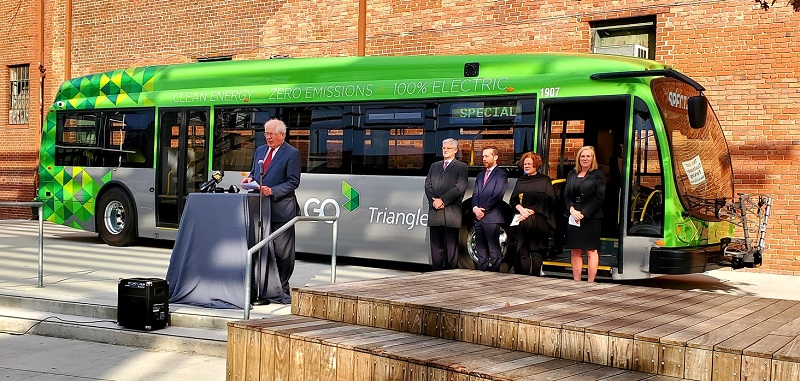This fall, the N.C. Sierra Club has been collecting signatures on a petition urging Gov. Roy Cooper to sign an executive order to put electric vehicle charging stations in every state park.
That'd be a big help to those of us who've made, or plan to make, the transition to electric cars for our own use. Additional charging stations - at some of our state's most popular destinations - would help our "drive" to cut transportation emissions.
But we want to make sure everyone benefits from our push to make North Carolina the "Green Roads State" - and not just by enjoying cleaner air. A growing number of our cities and towns are investigating and transitioning to electric buses for transit fleets, school buses and other public vehicles.
Transportation accounts for 28 percent of all greenhouse gas (GHG) emissions in the United States. In fact, between 1990 and 2018, GHG in the transportation sector increased more in absolute terms than any other sector. Heavy-duty vehicles such as buses and delivery trucks are the source of a quarter of all transportation GHG emissions, despite their far fewer numbers than cars and other light-duty vehicles.
The world leader in electric buses is China with about 420,000. But, as new models of electric buses and trucks become more mainstream and more state and local governments sign on, the U.S. total is growing, with 650 electric buses in 2020 - more than double the number in 2019, according to Bloomberg New Energy Finance.
Increasingly, U.S. metropolitan areas are pledging a complete shift to electric buses, including Los Angeles County by 2030, San Francisco by 2035, and Seattle (King County) and New York by 2040. In fact, California recently committed to all-electric transit buses statewide by 2040.
How does the technology work? Electric bus motors are powered by lithium-ion battery packs, which are recharged via plug-in chargers. Since electric buses do not use diesel or gas, they do not produce tailpipe emissions.
Why don’t more cities and counties convert their transit buses to electric? Cost is the main barrier; new electric buses can cost as much as 50% to 100% more than conventional diesel models, averaging $750,000 in the United States, compared to about $435,000 for a conventional diesel bus.
But the financial picture is actually brighter: Prices are much more competitive when fuel, operations and maintenance, insurance costs, and financing costs are factored in. The balance tips further in favor of electric buses when municipalities consider the health and lifestyle benefits from improved local air quality and lower traffic noise.
As battery technology has improved, so has the driving range of electric buses. Many can run all day without recharging. It's also helped affordability, with the average price of battery packs dropping about 85 percent since 2010.
 As new models of electric buses and trucks become more affordable, North Carolina cities are among those committing to a change. And Governor Cooper recently joined a multistate memorandum of understanding to zero-out emissions from new medium- and heavy-duty trucks and buses.
As new models of electric buses and trucks become more affordable, North Carolina cities are among those committing to a change. And Governor Cooper recently joined a multistate memorandum of understanding to zero-out emissions from new medium- and heavy-duty trucks and buses.
In 2019, Asheville bought five electric buses as part of the strategy for the city’s carbon neutrality plan. The impact is a reduction of 54 tons of carbon emissions per year per bus, or a total reduction of 270 tons of carbon per year. The buses were purchased with help from a Federal Transit Administration (FTA) grant. The Charlotte Area Transit System also received a federal grant in June 2020 to purchase electric buses and charging stations.
The City of Greensboro has 10 electric buses in daily service. Voters there approved a $4.5 million bond referendum to provide matching funds to buy the first 30 electric buses, and Greensboro leaders hope to replace more than 50 fossil-fueled buses with electric models by this fall. That will give the city the second-largest fleet of electric buses on the East Coast, behind Philadelphia.
In the Triangle, GoTriangle added two new electric buses and two charging stations as of January 2020 (the buses' debut is pictured), and RDU Airport added four electric buses to its shuttle fleet in 2019.
Smaller towns are on board as well. The Town of Chapel Hill/Chapel Hill Transit plans to buy 10 electric buses; it already has purchased three that are expected to be operational in 2021. All of Chapel Hill’s electric buses are built by Proterra Inc., a California company with a plant in Greenville, S.C.
The N.C. Department of Environmental Quality recently awarded funds from the Volkswagen settlement to local governments to buy electric buses. Durham, Raleigh, Greensboro, Charlotte, Salisbury, Fayetteville and Chapel Hill received funds for electric transit buses, while communities including Randolph, Swain, Watauga, Cabarrus and New Hanover counties received Volkswagen funds for electric school buses.
When we share our ride, we cut transportation emissions. When that ride is an electric-powered vehicle, we cut them even more. And when it's a mass transit vehicle that carries many passengers, we're taking a significant bite out of air pollution. That means healthier communities and, down the road, lower costs for clean transportation.
With funding available to help cities and counties electrify their transit fleets and with more of our communities committing to clean energy targets, electric buses should be the next step toward making North Carolina the Green Roads State.